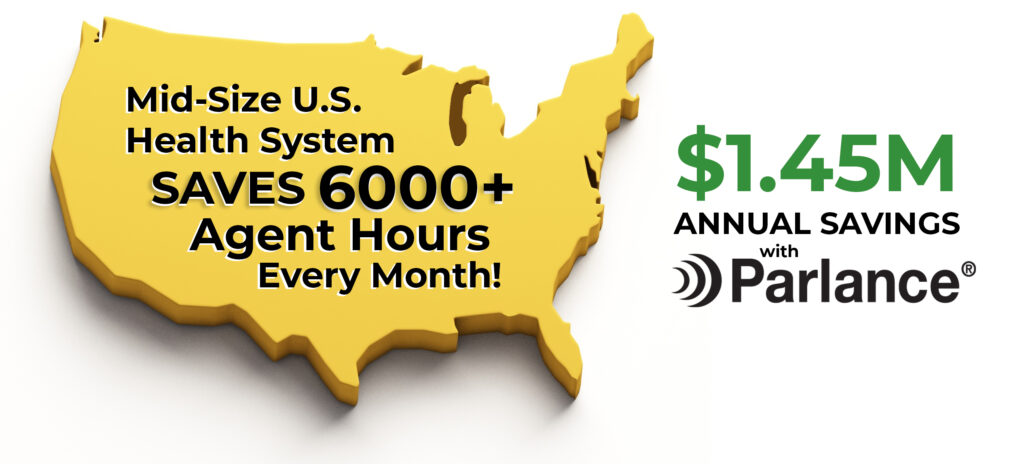While conversational AI is presently top of mind for every healthcare CIO, many are focused on short-term initiatives that will quickly improve operations, generate immediate ROI, and have a direct impact on the bottom line. But figuring out where to begin – identifying reliable solution partners who have extensive references, those with the proven ability to provide immediate improvements to operational efficiency, as well as deliver transformative digital health solutions as the health system infrastructure becomes ready for the change – is a challenge. How long will it take for the health system to start seeing ROI on the expenditure? How can decision-makers feel confident that workforce challenges like personnel shortages and staff burnout will improve, and that patient satisfaction will go up, not down? This is why healthcare executives are losing sleep!
Taking a pragmatic, phased approach to implementing conversational AI is affordable and can make things better for most health systems in as little as 30 days. Answering the phone and navigating a caller to the right resource is a complex process in a large health system. This complexity may explain why so few organizations do it well. An outdated, clumsy process for answering and navigating calls equals revenue leakage and wasted labor! Underperformance has huge cost implications because this process happens millions of times each year across the network of care. To create friction-free self-service for a diverse calling community requires the right technology and a robust routing engine that enables seamless communication across a large enterprise with entrenched silos.
Parlance, a leader in the healthcare IT space, works with many of the largest health systems in the country to alleviate contact center and switchboard burdens. More than a thousand hospitals and clinics partner with Parlance to elevate patient engagement and create operational efficiency.
In the current ecosystem of omni channel offerings, phone calls remain the clear preference of patients. The voice channel accounts for 70% of queries to hospitals and clinics, with individual health systems receiving millions, or even tens of millions of calls each year. In retail and hospitality sectors consumers often favor visiting a website for information, and email communication can feel more efficient. But healthcare is a very different landscape. People who call hospitals are waiting on crucial test results, seeking information for loved ones, inquiring about financial arrangements, needing to make a last-minute appointment due to injury or sickness…and some of these things push their emotions to the limit. These are not the kind of calls that can be delayed or rushed.
On the other hand, 50% to 60% of calls to health systems are relatively routine and can be automated. If it’s easy for people to speak naturally and get to the person, department, or information they need, most will happily self-serve.
Health systems across the nation are partnering with Parlance to reduce handling time and deflect repetitive tasks from agents, creating huge operational savings and improving patient calling experiences. Allowing agents to work at the top of their skill sets and reducing friction for callers delivers significant results to the bottom line.
“ROI for Parlance occurred within 90 days! If you’re a CIO looking for a quick win in the budget cycle, I would do this,”
Andy Draper, regional CIO for HCA Healthcare.
A health system in the Western U.S with 10 hospitals and 65 clinics saved 6,070 agent hours each month by partnering with Parlance, contributing to annual savings of $1.45 million. At a time when hospitals are trying to do the most with the least staff, these savings are critical.

CIOs are committed to implementing technology solutions that enhance patient care and boost operational efficiency while also integrating into the complex systems and business applications that are already a part of their health system’s unique environment. Implementing conversational AI to support contact center and switchboard operations is a practical approach that delivers results instantly. And scaling use of the technology can happen in phases that align with the business. A phased approach provides a steady stream of improvements – a win for patients and a win for the business.
“For more than 25 years, Parlance has been developing and leveraging the best of speech-enabled technologies. Today, Parlance has a practical and affordable approach to deploying conversational AI, and it’s fueling unprecedented growth for our business,” says Scott D’Entremont, Chief Revenue Officer at Parlance. “Our legacy of results speaks for itself. We have references from health systems across the country who have partnered with us for decades. Not just C-suite executive references, but references from go-live teams, patient access managers, healthcare consultancies, and operators/agents too. Parlance is a managed service subscription that provides not only industry-leading technology, but an ongoing partnership with tenured experts who take ownership of performance and guarantee ROI. We deliver immediate operational efficiencies while leading the charge toward client-readiness for integration of cutting-edge digital health innovations in conversational AI.”
Seventy-nine percent of CEOs ranked “burnout among non-physician staff” as one of the most pressing workforce challenges, according to a 2024 Becker’s Hospital Review article. “Patient satisfaction” and “access to care” were also ranked in the top 10 most concerning issues facing health systems today, by health system executives.
Photo: NicolasMcComber, Getty Images



